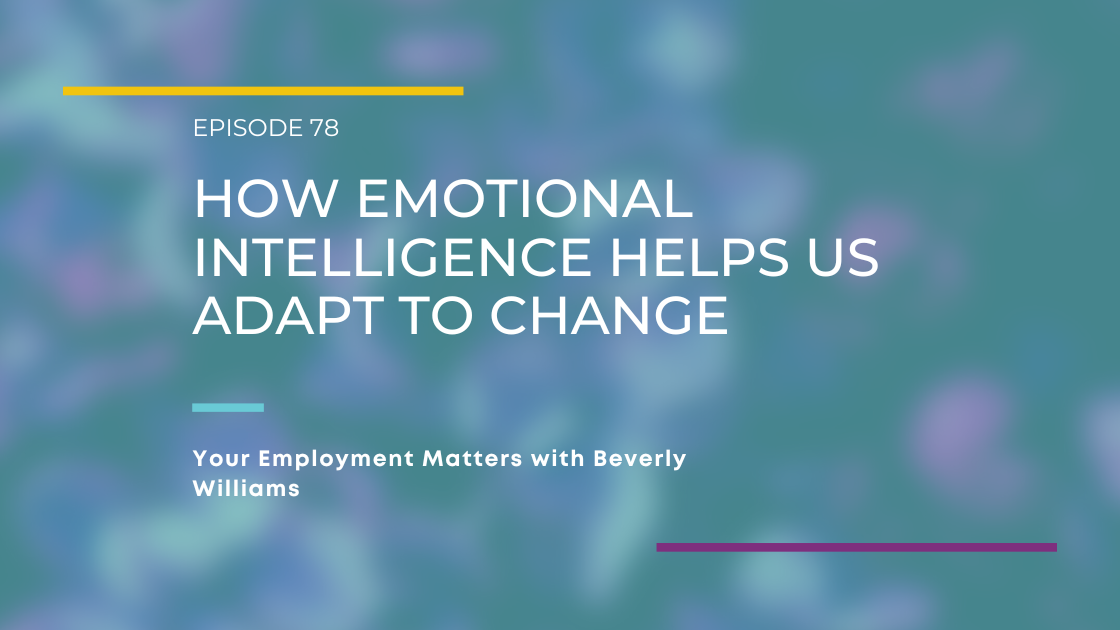How Emotional Intelligence Helps Us Adapt to Change
How good are you at handling change? Do you handle it well? How sure are you?
Joining us today is Elizabeth Power, a sought-after speaker, facilitator, teacher, and consultant. She is also the CEO of EPower & Associates, Inc., which provides training, coaching and consulting, and is the parent organization of The EPower Change Institute and The Trauma Informed Academy.
“The only time we welcome change and are excited by it is if we design the change, we execute the change, and it goes exactly as we want it to. Otherwise, we don’t like it very much, because it’s imposed on us, and we feel like we lose our ability to make choices.” – Elizabeth Power
Elizabeth’s mother said that Elizabeth has “gone through more change than a chameleon going through a costume ball.” Elizabeth agrees!
She started out as a shoe repairer at a Nashville, Tennessee shop that served celebrities. Elizabeth believed that she could not do anything more, until someone encouraged her to believe otherwise.
One day, a client came in, saw her, and said, “You are way too smart to be doing this. Don’t let yourself get stuck here.” That was the first time Elizabeth felt seen, and she kept that moment tucked in her heart for a long time. Since then, Elizabeth has worked in public welfare, had (and lost) other jobs, and had to learn how to deal with the different changes in her life.
Here are the key topics Elizabeth discusses:
- Our mindsets around change
- Choosing how we respond to change
- Developing our emotional intelligence and that inner connection to our own feelings
“If you can’t tolerate the discomfort of learning something new, or of taking in information from other people, you’re going to be stuck.” – Elizabeth Power
Today, Elizabeth spends her time helping people deal with change. She speaks to motivate others and to share her own story of hope and healing. And that’s exactly what she does in this episode.
Do you want to learn how to better deal with change? Listen to Elizabeth to receive her words of wisdom.
Connect with Elizabeth Power:
Leaving a review of this podcast is encouraged and greatly appreciated.
Check out Beverly Williams’ book on Amazon.com: Your GPS to Employment Success: How to Find and Succeed in the Right Job
Audio Clips:
- [04:07 to 04:31] Elizabeth: The feelings of change—any change—are not much fun. The only time we welcome change and are excited by it is if we design the change, we execute the change, and it goes exactly as we want it to. Otherwise, we don’t like it very much, because it’s imposed on us, and we feel like we lose our ability to make choices.
- [06:11 to 07:26] Elizabeth: So, let me talk a little about the two different ways that we can think about change. We can look at it as a problem, something to which we react, and do the same thing over and over and over again. And if we can’t tolerate the feelings it brings, feeling stupid, and anxious and angry and upset and all those things, we end up going into fight or flight. Hang on a bit because that’s important. If we can make it roll uphill and make that change as an opportunity—I am not talking positive middle attitude because that is going to feel the same old ugly way. We can say, “Okay, I’m going to respond, to think again before acting. I’m going to see what I can do because depending on the choices I make, which may take effort, will take effort, I’m going to either see goal attainment or growth out of it. But it takes a lot of practice to go from rolling downhill in fight or flight, which is a neurobiological response to fear, it takes a lot from doing that naturally to rolling uphill and saying, “Okay, I’m going to say yes to this change. I’m going to identify my choices. I’m going to make up my choices and I’m going to choose my way through this, so that I feel like I have some power.”
- [07:29 to 07:54] Elizabeth: We get taught, if we want it, we should have it. No, no. We have to work for it.
Beverly: But we might not get what we work for.
Elizabeth: We might not. We might not get it at all. Okay, if we don’t get that, what are we going to do if we don’t get what we thought we wanted. Are we going to redirect our energy? Are we going to take it as lessons learned? As opportunities and growth developed? And keep going? Where’s our resilience in change? - [28:22 to 29:21] We think that much of the frustration and the challenges that we face these days are in part because our emotional intelligence has been stunted. And we teach trauma-informed emotional intelligence to help people learn how to master self-awareness, self-regulation, social awareness, and social skills. And we don’t go for the mental illness side of trauma. We go for, how does it keep us from learning the skills that we needed to learn to be more successful? How does spending our lives as children engaged in devices keep us from learning the things that we need to have higher levels of cooperation, collaboration, and success with others and ourselves? How do we learn that even though we may have not gotten where we want to be, we are at least half-way there? Because I promise you this, as far as I have come, I will always have that far to go again.
Tags:
Related Posts
- Navigating Uncertainty and Building Influence: Wisdom from Kevin Eikenberry ( April 12, 2025 )
- Lessons from a Career at Facebook, Walmart & More with Tom Lenoble ( March 28, 2025 )
- The Clarity of Success: Insights from Clarity Ops CEO Garrett Delph ( February 12, 2025 )
- Building Resilience and Achieving Financial Freedom with Dr. Robert Ramirez ( October 29, 2024 )
- Voting in America ( October 17, 2024 )
- Art, Integrity, and the Pursuit of Truth with Stephen Kurkjian ( August 23, 2024 )
- Redefining Power Dynamics in Negotiation Beyond Gender ( July 5, 2024 )
- Navigating Labor Dynamics: Insights from Beverly A. Williams (Guest) on How To Live a Fantastic Life ( July 2, 2024 )
- Aligning Values and Roles in the Workplace ( June 11, 2024 )
- Why Unions are Still Needed in Today’s Workplace ( April 22, 2024 )

